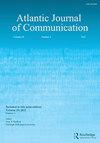Affective polarization and political engagement in the United States: what factors matter?
IF 1
Q3 COMMUNICATION
引用次数: 1
Abstract
ABSTRACT This article examines the factors that predict affective polarization and political engagement in the United States. Using an original survey dataset (N = 1,100) of a fairly representative national sample, this study explored some factors (e.g., age, gender, political ideology, and partisan news media and social media) to see how they predict affective polarization and political engagement. The results could be helpful to further study widening affective polarization, which is reportedly affecting democracy itself, in this current political and public opinion atmosphere “Trumpfied” in the last couple of years. The insights found in this research could also help devise political and social campaign strategies that minimize polarization gaps. The results might enable corporate entities to better classify their consumers based on relevant issues associated with polarization and political engagement. Future research is encouraged to combine survey data and social media data for a more refined outcome.美国的情感两极分化和政治参与:哪些因素起作用?
摘要本文探讨了预测美国情感两极分化和政治参与的因素。本研究使用具有相当代表性的国家样本的原始调查数据集(N = 1100),探索了一些因素(例如年龄、性别、政治意识形态、党派新闻媒体和社交媒体),以了解它们如何预测情感两极分化和政治参与。这一结果可能有助于进一步研究在过去几年“特朗普化”的当前政治和舆论氛围中不断扩大的情感两极分化,据报道,这种两极分化正在影响民主本身。在这项研究中发现的见解也可以帮助制定政治和社会竞选策略,以最大限度地减少两极分化。研究结果可能使企业实体能够根据与两极分化和政治参与相关的问题更好地对消费者进行分类。鼓励未来的研究将调查数据和社交媒体数据结合起来,以获得更精确的结果。
本文章由计算机程序翻译,如有差异,请以英文原文为准。
求助全文
约1分钟内获得全文
求助全文

 求助内容:
求助内容: 应助结果提醒方式:
应助结果提醒方式:


